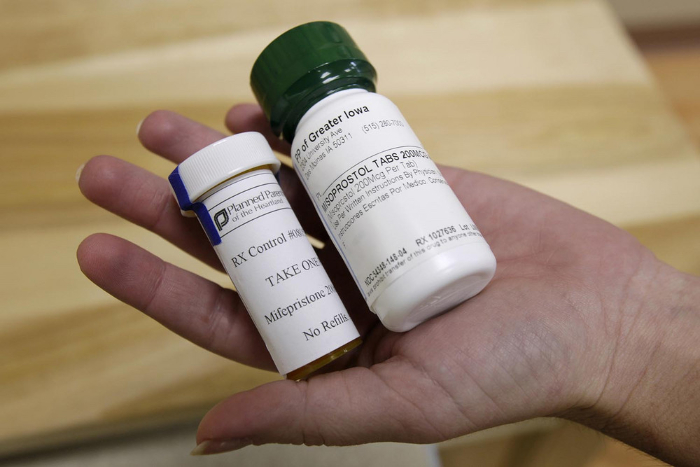
Mail-order abortion pills could help millions of people discretely terminate their pregnancies should the Supreme Court strike down Roe v. Wade in the coming months, providing a way to circumvent mounting state-imposed restrictions.
But the majority of patients and many doctors remain in the dark or misinformed about the pills, how to obtain them, where to seek follow-up care and how to avoid landing in legal jeopardy, according to medical groups, abortion-rights advocates and national polls.
That knowledge gap has left advocacy groups scrambling to get accurate educational, medical and legal information out about the pills to patients and providers.
With both pro-abortion- and anti-abortion-rights groups expecting Roe v. Wade to be limited or overturned this summer, advocates have increasingly focused on the pills as one of the next fronts in the 50-year battle over the right to terminate a pregnancy.
Nonprofits and activist groups are posting online guides to obtaining the pills, holding pro-pill demonstrations in front of the Supreme Court and around the country, buying ads this month on the New York City subway, and driving mobile billboards around Texas. Organizations are recruiting volunteers and hiring staff for 24-hour hotlines that walk people through the process of taking abortion pills, in anticipation of an uptick in demand. Some doctors’ associations are launching national campaigns in May to teach members how to prescribe the pills and urging them not to turn patients over to law enforcement. Organizations that help low-income people pay for abortions are raising millions, in part to help purchase the drugs, which can cost over $500.
Advocates say the new availability of FDA-approved abortion pills that can be prescribed online and mailed to patients’ homes could be what prevents people from returning to a pre-Roe era when back-alley surgeries, herbal concoctions and coat hangers were among the only options.
But that won’t happen unless more people are aware of the pills, known as mifepristone and misoprostol, and are able to access them.

“There are so many people who don’t know that mifepristone even exists,” said Ushma Upadhyay, an associate professor and Ob/Gyn at the University of California at San Francisco who is leading a study on the use of abortion pills in 20 states. “They still picture a dramatic surgical procedure when they think about abortion.”
Anti-abortion-rights groups also have zeroed in on the pills, successfully lobbying dozens of states to enact bans and creating websites, ads and films to deter people from using them. Just in the last few weeks, they’ve celebrated restrictions on the pills passed in Kentucky, Georgia, and South Dakota.
In a statement, Susan B. Anthony List President Marjorie Dannenfelser said such bans are “vital to stop the proliferation of dangerous mail-order abortion drugs, which puts both unborn children and their mothers at serious risk.”
Yet orders for the pills are increasing, particularly during the pandemic as patients sought to avoid all kinds of in-person care and as several GOP-led states imposed restrictions that made brick-and-mortar abortion clinics harder to access. This year, the drugs became the most popular method of ending pregnancies in the U.S.
Still, despite the increased use, only one in five adults has heard of medication abortion, according to the Kaiser Family Foundation. And even many of those who are aware are deterred by a wave of state bans on the drugs and fears about the consequences of using them.
The recent arrest of a young woman in Texas, who was charged with homicide and held in jail on a $500,000 bond after self-managing her abortion, has exacerbated these concerns. While those charges were quickly dropped after local activists mobilized, abortion-rights advocates said the story could scare patients from taking the pills and scare doctors from treating those who have.
Bhavik Kumar, a doctor in Texas who sits on the board of Physicians for Reproductive Health, said the state’s law allowing private citizens to sue over suspected illegal abortions has sown fear and confusion in the medical community, and fueled instances like the arrest earlier this month of 26-year-old Lizelle Herrera, who was reported to law enforcement by the medical workers she turned to for care.
“The fact that there could be a lawsuit against anyone who aids and abets an abortion is muddying the waters,” he said, referring to Texas’ law several states are looking to copy that uses private lawsuits as its enforcement mechanism. “Some providers are concerned about what constitutes aiding and abetting, even after the abortion has taken place. And certainly one of my concerns is that particularly folks of color and undocumented folks who already have difficulty accessing health care, when they hear about a case like Herrera’s in the media, they may be afraid to seek care when they need it following an abortion.”
The medical and advocacy groups that successfully petitioned the FDA last year to lift restrictions on mail delivery of the drugs point to studies that show the pills are about 95 percent effective in ending a pregnancy and have less than a 1 percent rate of complication.
The pills, however, can only be used within the first 10 weeks of pregnancy — meaning that by the time many people realize they are pregnant and figure out how to obtain them, it may be too late.
April Lockley, the medical director of the Miscarriage and Abortion Hotline, a phone and text line that supports people who decide to self-manage abortions, said many who call are not sure of their options.
“Some people do specifically say, ‘I’m looking for medication abortion pills,’ but other people just essentially are saying, ‘I’m pregnant, I don’t want to be, and I don’t know what to do,’” she said.
But even when a patient is within that window, several barriers remain.
Patients in states with restricted access to the pills must cross state lines, lie or omit information about where they are during a telehealth visit with an out-of-state provider, or purchase pills from a foreign pharmacy — options that may carry some legal risk for the patient.
While Planned Parenthood and some other providers that prescribe the pills have set up hotlines and posted medical information online, many patients don’t know about them, and some go to the emergency room after taking the pills to determine whether the procedure was successful or to ask whether their bleeding is normal.
“They need to know what number to call if they need us, that we’re here 24/7, and that there are no dumb questions,” said Danika Wynn Severino, the vice president of abortion access for Planned Parenthood’s Consortium of Abortion Providers. “Patients want to know that they’re going to be safe. They want to understand what’s happening to them.”
Patients who tell their doctor that they have taken pills in a state where their use is criminalized could end up in legal jeopardy. Despite the fact that doctors are not required by any state law to report self-managed abortions to law enforcement, providers may mistakenly believe they are, so advocates have begun coaching patients on how to protect themselves should they seek post-abortion care.
“I tell my patients that it’s always best to be honest,” said Kumar, the abortion provider in Texas. “But I understand why, in today’s climate, they may not want to fully disclose things. So I also tell them that the medications used in an abortion are not detectable by a blood test and that it’s indistinguishable from a miscarriage.”
Another major flank for abortion-rights advocates focuses on medical providers, many of whom learned little about abortion in school or have an outdated understanding of the options.
Innovating Education in Reproductive Health, a program within the UCSF Bixby Center for Global Reproductive Health, has released a series of videos titled “When Abortion is Not Available,” to educate providers in states where in-clinic abortions are not allowed or are limited about how to assist patients. Another group, Physicians for Reproductive Health, is launching a three-month national campaign in early May aimed at doctors unfamiliar with or wary of abortion pills.
“People who trained in the 60s and 70s saw the tragic and unfortunate circumstances of what people self-managing their abortions looked like before the legalization and invention of medication abortion,” said Kelsey Rhodes, the group’s interim director of communications. “So too many doctors have an image in their mind of what self-managed abortion is that doesn’t align with the reality today.”
With a Supreme Court decision looming, and with as many as half of states poised to join Texas in outlawing most or all abortions, use of the pills is predicted to climb. Yet activist and medical groups that support abortion rights fear the legal and educational infrastructure is inadequate to make the drugs a real option for millions of people.
“We've had one state where abortion has effectively been outlawed, but not technically outlawed, and we've seen the added barriers and burdens and harm and impact that that's having on people,” said Andrea Miller, president of the National Institute for Reproductive Health. “Multiply that out by a magnitude of 10 — much less the potential magnitude of up to half the states — there's no question that these kinds of resources that are available need more support.”
----------------------------------------
By: Alice Miranda Ollstein and Megan Messerly
Title: Abortion advocates’ strategy depends on pills. An information gap threatens their efforts.
Sourced From: www.politico.com/news/2022/04/24/abortion-advocates-strategy-depends-on-pills-an-information-gap-threatens-their-efforts-00027309
Published Date: Sun, 24 Apr 2022 06:00:00 EST
Did you miss our previous article...
https://consumernewsnetwork.com/politics-us/how-far-does-chinas-influence-extend-at-the-us-how-far-can-chinas-influence-at-us-universities-go-one-student-tried-to-find-out






